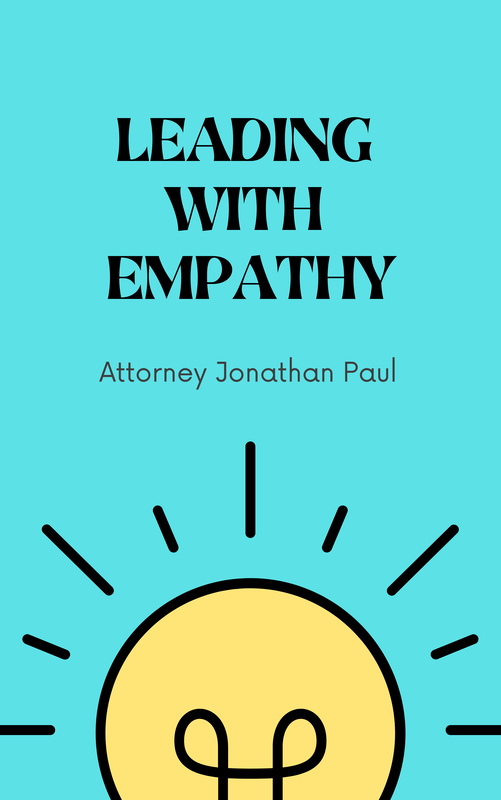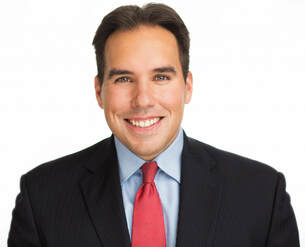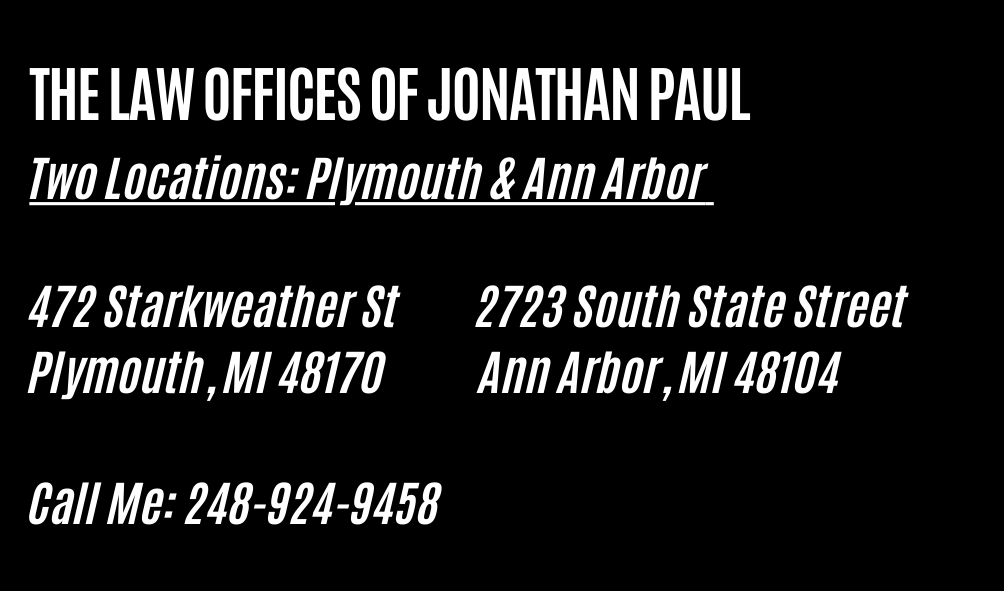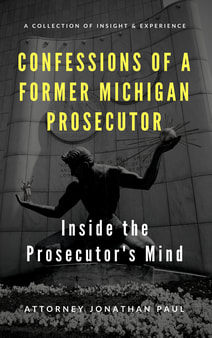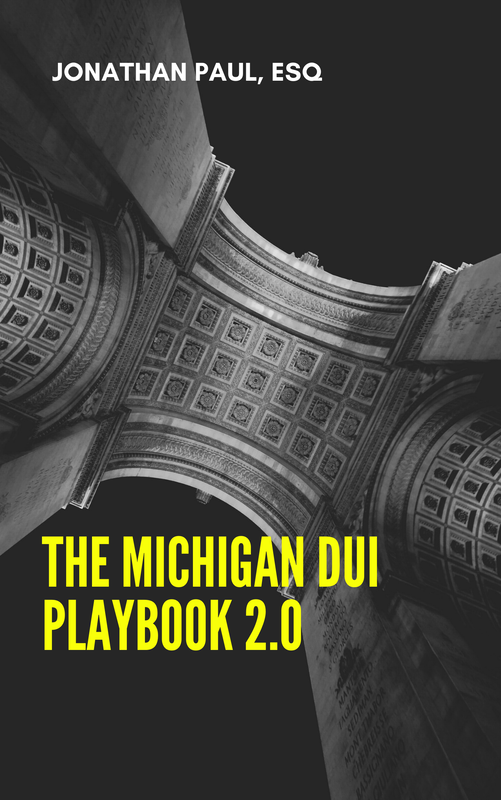Michigan Circuit Court Hardship Appeal - How to work with the prosecutor to get the green light5/21/2018
As a former prosecutor I worked on 1000's of drunk driving cases, and one of the main concerns of the person charges was their ability to drive. A person doesn't realize how important the ability to drive actually is until they are no longer able to do so. It means you can't drive to work, school, drive your kids or family around, go grocery shopping, leave the house to eat or entertainment. Losing your license can be a huge burden on a spouse or friends and family, and I have seen relationships ruined because someone can't drive their car.
One role that a prosecutor has in Michigan is on a circuit court hardship appeal. If someone violates the implied consent law for refusing a chemical test and that ruling is upheld on appeal, a petitioner (the defendant) has the option to file a hardship appeal with the circuit court on the basis of hardship if this is there first implied consent issue. Some counties will have a representative from the Attorney General's Office as a representative for the Michigan Secretary of State, while others will actually have the county prosecutor act as the representative. The court is ultimately looking for a real hardship tied into your ability to work, go to school, perform obligations of your probation and other listed issues. They also want to be sure that public transportation or reasonable alternative accommodations are not available to the petitioner. If you lived down the block from where you work, you could not claim a legitimate hardship to get to and from work as a basis of receiving the license. Many people walk into court and simply say "here is where I work, and here is where I live, I need to drive". That is lazy and not the most effective way to convince both a judge and prosecutor to OVERTURN a license suspension. Think about what that means - you violated the law (implied consent law), your license was suspended because of it, and now you're asking for that decision to be overturned, and all you're going to do is show where you work and where you live? As a former prosecutor I witnessed too many of these situations go wrong, because people did not over-prepare and take the process as seriously as they should from day one. As a proactive criminal defense attorney, we may be shifting gears from our criminal case to the circuit court, but we can use all of our proactive accomplishments for these stage as well. The most important parts will be the substance abuse evaluation and any subsequent following of that recommendation along with the daily alcohol testing. Neither is required, but the substance abuse evaluation is expected, and daily alcohol testing is usually the cherry on top of receiving the hardship license. I can't tell you how many times I've been out in the hallway with the prosecutor/AG representative with another attorney, and all they have is "well it's his first implied consent, and he works 20 miles from where he lives" - I sometimes wish I was the prosecutor again so I could tell that defense attorney - "well he shouldn't have refused the chemical test, I'm not changing the suspension for you" - that's just lazy lawyering - the client could have done the same thing in court. I have my substance abuse evaluation ready, AA meeting logs, alcohol insight class completion certificate, counseling letters and printout of our daily alcohol testing. We're showing the prosecutor that from day one we were open about learning from the situation, followed the recommendation of the health care professional, and you should grant this hardship, because my client HAS NOT BEEN DRINKING and here is proof of that. Not all petitioners are being alcohol tested or even on probation with a court so there's concerns about handing someone a license who is actively drinking - what better than to show proof that my client is not drinking? I always believe in building consensus with a prosecutor, because I learned if you want to go toe to toe with a prosecutor, they will prevail more than they are defeated, because a judge is naturally more familiar with that person and it's the more conservative thing to do. Handing my client the ability to drive soon after a DUI incident is risky, and I acknowledge that - that is why my clients work their butts off to show they should be granted the opportunity to earn back the trust of the prosecutor, judge and community. If I can get the prosecutor to sign a stipulated order for a hardship license in the hallway and we can walk into the courtroom and BOTH tell the judge we want petitioner to receive a hardship license, what's the judge going to do? Say no? Probably not. Some judges will still have concerns, especially newer judges or judges who are not that familiar with these type of proceedings, but I use the same proactive tools with the judge to get my client over the hump, and get them back on the road. When charged with a DUI in Michigan, there are a number of consequences; one of those consequences is impact on your driver’s license. The court has no say over what happens to your license, because the Michigan Secretary of State is the lone authority on what happens to your ability to drive if convicted of DUI offense.
The Michigan Secretary of State can only sanction a Michigan driver’s license, which means if you have an out of state license, Michigan cannot do anything other than control your ability to drive within the State, but not outside of the State. The Secretary of State can either restrict, suspend or revoke a driver’s license. A restriction allows some driving, typically to school, work, medical appointments, community service, counseling, court and a few other exceptions. A suspension can take away the driver’s ability to drive for a limited period of time, and once the time passes, the driving privileges resume. Revocation is a lifetime loss of driving privileges, but they can be restored by the Secretary of State at a future, but uncertain date. License impact depends upon the type of conviction. Here is a brief breakdown of the most common offenses. * Impaired Driving - 90 days restricted driving * Zero Tolerance - 30 days restricted driving * Intoxicated Driving/Drugged Driving - 30 day suspension, 150 days restricted * Super Drunk - 45 days restricted driving, 320 restricted with ignition interlock installed * Second Offense - 1 year suspension * Third Offense - license revoked, eligible to reapply after 1 year In Michigan, the criminal penal code says it’s a second offense if you have two convictions within seven years; the date of offense is used on the subsequent offense to make this determination. So if you were convicted on September 2nd 2001, you would fall into the second offense category if you are subsequently arrested on or before September 2nd 2008. For a third or more offense, there is no time limit; it’s simply within a lifetime. So you can have a conviction from 1950, 1999 and 2016. There isn’t much strategy in timing when it comes to the criminal code; the best approaches are defeating the case, or resolution with a reduction, sobriety court or sentencing agreement. While timing for the criminal code can’t be impacted, it is the exact opposite when it comes to the Secretary of State. The Secretary of State has the same seven year mark for second offenses, but they use the conviction date for measuring this period. This means that if you were convicted of a DUI on September 2nd of 2001, and subsequently arrested in the summer of 2008, there is a lot of strategy involved. If my client has decided to resolve the case or even go to trial, we make sure the “end” of the case takes place after September 2nd of that year, which would put us outside of the seven year window. The client if convicted would be treated as a first offender outside of the seven year window. This strategy could mean the difference between losing his/her ability to drive for a full year vs being restricted for 90 days. This same strategy is even more crucial when it comes to third offenses. Unlike the criminal penal code, the Secretary of State does use a ten year window. Many of my clients have two very old DUI’s from 10 to 20 years ago. While they will still be charged as a third offender, they can escape the license sanctions for a third offender with the right timing. There’s a chance a third offender could be treated as a second offender, or even a first offender with the right timing strategy. Under MCL 257.319(18), a person with a restricted license is allowed to drive in the course of his or her employment or occupation and to and from any combination of the following:
(i) The person’s residence. (ii) The person’s work location. (iii) An alcohol or drug education or treatment program as ordered by the court. (iv) The court probation department. (v) A court-ordered community service program. (vi) An educational institution at which the person is enrolled as a student. (vii) A place of regularly occurring medical treatment for a serious condition for the person or a member of the person’s household or immediate family. (viii) An ignition interlock service provider as required. You must “carry proof of his or her destination and the hours of any employment, class, or other reason for traveling and [must] display that proof upon a peace officer’s request.” MCL 257.319(18). There is no provision in the statute that defines proof of destination. To comply with the intent of the statute, it is recommended that anyone using a restricted license for work purposes should have a letter from the employer stating hours and territories and places visited. A college student should carry his or her class registration papers. Carrying a probation order should speak to probation visits, community service, and court-ordered alcohol or drug treatment. If driving for medical treatment purposes, your client should carry the doctor or medical facility’s phone number to confirm the appointment. |
Click to Email Me Categories
All
|
Ann Arbor Office LocationPlymouth Office Location |
Representing DUI Clients in MichiganRepresenting clients charged with a DUI in Ann Arbor, Canton, Brighton, Howell, Saline, Adrian, Taylor, Plymouth, Northville, Westland, Ypsilanti, Pittsfield Towsnhip, Warren, Sterling Heights, Farmington, Pontiac, Romulus, Lansing, Novi, South Lyon, Southfield, Birmingham, Bloomfield Hills, Royal Oak, Troy, Rochester, Jackson, East Lansing, Garden City, Livonia, Dearborn, Detroit, St Clair Shores, Hazel Park, Ferndale, Madison Heights, Waterford, Milford, Shelby Township Clarkston, Oak Park, Berkley, Fraser, Sterling Heights, Clinton Township and others throughout Washtenaw, Wayne, Monroe, Jackson, Genesee, Macomb, Ingham, Lenawee, Livingston and Oakland County.
|

